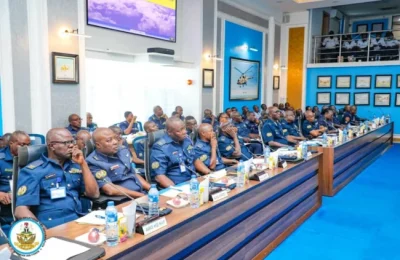Reach the right people at the right time with Nationnewslead. Try and advertise any kind of your business to users online today. Kindly contact us for your advert or publication @ Nationnewslead@gmail.com Call or Whatsapp: 08168544205, 07055577376, 09122592273

Collins Nnabuife, AbujaThe Deputy Director-General of the United Nations Food and Agriculture Organization, Maria Helena Semedo has said that if proper steps are not taken, by 2050, two-thirds of the world population could face water shortage.Semedo made this known in an opinion she released in commemoration of this year’s World Water Day.She said the world is already in water crisis, as in many places, water withdrawals exceed recharge rates.She noted that climate change is causing droughts and floods all over the globe, while water bodies that support vital biodiversity and production of food, both aquatic and on land, are compromised by reduced irregular flows and pollution.“At the UN 2023 Water Conference, the international community aims to emerge with a Water Action Agenda to protect one of humanity’s most critical resources. Agriculture, the sector most dependent on freshwater, must be central to this agenda.“The numbers are already stark. Over 700 million people face high and critical water stress and over 90 percent of natural disasters are water related. The situation is worsening. Global water availability and quality are deteriorating.“Climate change is intensifying. Competition between sectors and countries is increasing. By 2050, two-thirds of the world’s population could face water shortages.“Agriculture currently accounts for 72 per cent of freshwater withdrawals. On current trends, an additional 35 per cent in water resources will be needed by 2050 to meet growing demand for food, fibre and feed. At the same time, demand for other uses is increasing. These numbers clearly don’t add up.“This is hugely worrying for efforts to end hunger and poverty, because there can be no food and agriculture, and the livelihoods it supports, without clean and sufficient water – for irrigation of crops, for livestock, and for the many species that live in aquatic ecosystems. Agriculture – including forestry, fisheries and aquaculture – also plays a crucial role in the management of surface water, groundwater recharge and even circulation of atmospheric water, thanks to forests”, she said.The FAO Deputy Director General further stated that if the world is to protect the future of food and meet the Sustainable Development Goals, the needs and role of agriculture must be supported.She said agriculture itself needs to get more efficient at using water, better at keeping pollutants out of water bodies, and more resilient to climate change.“The key is to act now with integrated water resource management approaches to produce more food, fibre, feed and biofuel with less water, more sustainably.“At the top level – the kind of outcomes we need to see from the UN 2023 Water Conference – we need strong political will. We need collaboration, not competition, between sectors that use water. Proper planning can reverse land and water system degradation and reduce competition for resources when combined with innovative technical, institutional, governance and financial support.“For example, watershed management approaches that manage freshwater systems and their fisheries, forestry, and agriculture services minimize trade-offs and leave no one behind.“Targeted investments and innovations in solutions for treated wastewater reuse, coping with drought and water scarcity, and circular bioeconomy approaches can help tackle water-related challenges. The sustainable use of biodiversity adapted to climate and soil conditions is key.These top-level approaches will only work if they feed down to the people who will implement the changes. We need to support those who grow and produce food on rainfed systems, water harvesting, efficient irrigation methods, drought-resistant crops and much more.“We need to support them to restore wetlands and other ecosystems, which perform critical services; secure land tenure is critical here. All approaches must encompass indigenous knowledge, science and technology, and country experiences. Crucially, those who produce our food need to be helped with the transition so that their livelihoods don’t suffer any short-term dip”, she added.
Reach the right people at the right time with Nationnewslead. Try and advertise any kind of your business to users online today. Kindly contact us for your advert or publication @ Nationnewslead@gmail.com Call or Whatsapp: 08168544205, 07055577376, 09122592273







